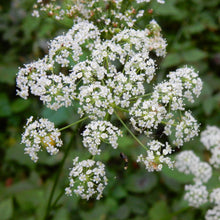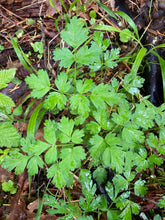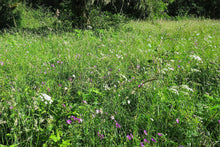
Ligusticum apiifolium
Celery-leaved lovage, also known as parsley-leaved lovage or celery-leaved licorice-root, is a versatile, sweet wildflower with an upright form and anise aroma. Its low-growing, branched stem is coated with stiff short hairs and sports widely triangular, bright-green leaves that are divided into fern-like leaflets. Like its other carrot-family cousins, robust flower stalks rise above the foliage boasting ornate clusters of up to two dozen tiny white star-like flowers, which attract pollinators. This species is very long-lived and rarely grown in nurseries, which makes finding it extra-special!
- Plant type/canopy layer: deciduous, perennial, herbaceous plant
- Size at maturity: 12-24” tall, equally wide
- Light requirements: full sun, part sun/part shade, full shade
- Moisture requirements: moist to dry soil, prefers well-drained
- Bloom time: May - September (May - June in the Portland Metro area)
- Growth rate/ease: medium growth rate, easy to grow
- Wildlife support: supports caterpillars and pollinators
- Native habitat/range: found in meadows, coastal prairies, openings in mixed evergreen forests, and oak woodlands, sea level to 1800m, from the coast to the Cascades in northwestern California, Oregon and southwestern Washington. Portland Plant List - yes.
- Special features & uses: drought tolerant; deer resistant; leaves are edible and can be eaten in small quantities to stimulate digestion; landscape uses include pollinator gardens and woodland gardens
Gardening with Celery-leaved Lovage: Once prolific in the Willamette Valley, this species boasts versatility and excellent habitat value. This beauty can endure pretty much any amount of sunlight, though one should note that as many species receive more sunlight, they also require more water - so a partially sunny site will suit this beauty perfectly. Soils should be moist to dry with decent drainage. It is drought-tolerant once established, but would also appreciate infrequent summer water in drier areas and/or sunnier areas. It will self-sow moderately when in ideal conditions.
Seed Sowing Instructions: Does not require stratification
Photo Credits 1 & 3: © Ed Alverson, some rights reserved (CC-BY)
Photo Credits 2: © Colton Veltkamp, some rights reserved (CC-BY)
Photo Credits 4: © Gail A Baker, some rights reserved (CC-BY)







